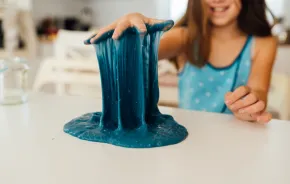In the photograph, my dad wears his thick-framed professor glasses to study the game he, my brother and I have just spent an entire afternoon inventing. We have dubbed it “Soccer Board.” Black and red plastic pieces, borrowed from a Risk game, are laid out on a rectangular board of tiny squares, representing two teams. Eleven years old in a V-neck shirt and feathered hair, I sit by his elbow, staring at the green piece representing the ball as he scoops two red dice and prepares to “kick” it. His lips part with the hint of a smile.

My dad believed that you didn’t need to buy anything to have fun. When we were at the beach, he frowned on “artificial aids” such as boogie boards or swim fins, preferring to plunge headfirst into the Pacific Ocean and catch waves with just his body propelled by Mother Nature. My brother, sister and I followed his happy hollers into the surf and learned to body surf by competing in his wave riding contests, one point for each wave you caught, two points for the longest ride.
One investment my dad seemed to allow was the purchase of a deck of cards. We grew up playing all sorts of card games, but a family favorite was poker, not Texas Hold'em, like on TV, but all sorts of variations, from Baseball to High/Low Split the Pot, to Spit in the Ocean. Instead of poker chips, we used broken matchsticks or toothpicks or whatever was available. When we played for money, we had fierce battles for pocket change, never more than a dollar.
Above all, my dad, a literature professor, loved the language of poker, which he picked up in the Coast Guard. We grew up dealing out commentary with the cards: “No help! Suicide king. Working on a straight.” My sister tells me my dad took great delight in hearing me, at a very early age, lay down my cards and growl, “Read 'em and weep!”
You could say it was my dad’s love of game that took him from us 25 years ago. He died after a game of racquetball with a colleague he was teaching how to play. Driving home to his wife and three kids, his heart stopped on a freeway ramp with a view of an ocean sunset. He was 55.
I was a high school senior and two weeks earlier had beaten my dad at tennis for the first time ever. My dad played to win, but only because he thought it was more fun if the challenge were authentic. At the memorial service, his colleague told how my dad, before their racquetball game, talked with pride of my finally beating him in tennis.
 My son, Milo, age 8, though he never got to meet his grandfather, embodies much of his love of games as well as his ability to invent them. When he was 4 years old, all Milo needed was a rubber band to keep himself busy, disappearing for hours into the back yard to shoot the rubber band high into the sky and make lunging dives for it, sometimes crashing into the fragrant African daisies or flopping on the hard turf and wild burrs of the neglected lawn.
My son, Milo, age 8, though he never got to meet his grandfather, embodies much of his love of games as well as his ability to invent them. When he was 4 years old, all Milo needed was a rubber band to keep himself busy, disappearing for hours into the back yard to shoot the rubber band high into the sky and make lunging dives for it, sometimes crashing into the fragrant African daisies or flopping on the hard turf and wild burrs of the neglected lawn.
Periodically, he stuck his head into the house, to issue reports. “Papa, it’s A’s 37, Yankees 15.” The Yankees always lost.
As Milo entered elementary school, he embraced all the latest fads with glee and innovation. When he and his kindergarten buddies were all chanting, “1-2-3 Let it rip!” and sending the spinning metal tops known as Beyblades into battle, Milo came home and turned everything he could get his hands on into a top, constantly spinning coins and milk jug tops. I even saw him spin a spiky sweetgum seed on top of trashcan.
In first grade, Beyblades gave way to a game I played as a kid, Carrom, the kids’ version of billiards using pool cues to hit ring-shaped pieces into corner pockets. When the recess bell rang, Milo and friends exploded from class to race to the three Carrom tables, leaning down and shooting the white ring to knock the green or red rings into the pockets.
When he got home, Milo created his own Carrom game, using a checkers board and pieces, two chopsticks and four large, pin-on Obama buttons, which he set up in the corners instead of pockets; he worked his chopstick back and forth like a pool cue and POW! he was in business. He kept the set in an old Checkerboard box, badly in need of tape, slid under the big red couch in the living room.
Every afternoon, Milo hung up his backpack on the hook in his room, tossed his lunch box on the kitchen counter, kicked his shoes into the basket on the porch, thump, thump, and slid his long body on his belly under the couch. Already mumbling to himself with excitement, he pulled out the game, set it up on the striped carpet, and got cracking: Milo vs. Milo, narrated by Milo. He kept score for hours, narrating the shots as he went.
I never asked how he distinguished himself from himself when he played those one-boy games or how he justified his triumphant announcements of, "Papa, I'm winning 12 to 7!" for didn't that also mean he was losing 7 to 12?
He had no trouble with this deep paradox. Watching from the couch, I took comfort in Milo’s ability to tip the scale towards his own victories, for even when we are beating ourselves up aren’t we also the ones administering the beating?
Most recently, my family attended a women’s basketball game at a local college. Milo sat transfixed as the women spun, passed, leapt and, above all, sunk gorgeous shots from behind the three-point line. Back home, Milo found an old hacky-sack of mine and began shooting it onto the ledge above his bedroom door. Whenever he made a “basket,” he had to call me to get it down.
Not in the mood to leave the couch every few minutes, I soon banned this game. Undeterred, he found a brown paper grocery bag, ripped open the bottom, and hung it from a string of bells on the wall. “Papa!” he called. “From behind this chair it’s a three-pointer!” He bent his knees and sent a shot arching over the dining room, sinking into the bag and falling with a soft thud on the ground. “Yeah-heh!” he hooted.
While I am desperately grateful that my son has inherited my dad’s ability to create games from thin air, his innovations also remind me of how much I miss my dad, how he would have loved to see Milo’s innovations, and how many games he and I didn’t get to play together. For 25 years, he hasn’t been there at family holidays to cut the cards. It always feels like we’re playing a man short.
Recently I taught both my kids to play poker. I taught them that a full-house beats three-of-a-kind and how to equal the pot when they receive a three face-up in
“Baseball.” I flipped the cards in front of them and modeled the proper commentary, “Working on straight. No help. Possible flush.”
As we laughed and played the traditional last hand of “The Stupid Game,” licking our fingers, placing them on our foreheads and affixing a card facing out, something dawned on me. While I can never go back to being that little boy sitting at the poker table, feeling safe and happy in a game with my dad, I can, in fact, still have a seat at the game. It’ll still be a dad and his kids lost in the love of game, but this time around I’ll deal the cards.
 About the author: Evan Nichols has been an elementary school teacher in the public schools for the past sixteen years. He is a Teacher Consultant with the Bay Area Writing Project and the editor of Digital Paper, a literary eZine for Bay Area teachers. He lives in Oakland, California, with his wife and two children, an 11-year-old daughter and 8-year-old son. He just finished earning an MFA in Creative Writing at Mills College. At left, he is pictured with his dad.
About the author: Evan Nichols has been an elementary school teacher in the public schools for the past sixteen years. He is a Teacher Consultant with the Bay Area Writing Project and the editor of Digital Paper, a literary eZine for Bay Area teachers. He lives in Oakland, California, with his wife and two children, an 11-year-old daughter and 8-year-old son. He just finished earning an MFA in Creative Writing at Mills College. At left, he is pictured with his dad.









